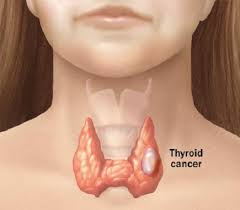- Home
- Editorial
- News
- Practice Guidelines
- Anesthesiology Guidelines
- Cancer Guidelines
- Cardiac Sciences Guidelines
- Critical Care Guidelines
- Dentistry Guidelines
- Dermatology Guidelines
- Diabetes and Endo Guidelines
- Diagnostics Guidelines
- ENT Guidelines
- Featured Practice Guidelines
- Gastroenterology Guidelines
- Geriatrics Guidelines
- Medicine Guidelines
- Nephrology Guidelines
- Neurosciences Guidelines
- Obs and Gynae Guidelines
- Ophthalmology Guidelines
- Orthopaedics Guidelines
- Paediatrics Guidelines
- Psychiatry Guidelines
- Pulmonology Guidelines
- Radiology Guidelines
- Surgery Guidelines
- Urology Guidelines
Artificial intelligence enhances diagnostic accuracy of thyroid cancer: Lancet

China: A new artificial intelligence (AI) algorithm can enhance the diagnostic accuracy of radiologists in detecting thyroid cancer on ultrasound, according to a new study published in the journal Lancet Oncology.
Xiangchun Li, Tianjin Cancer Institute in Tianjin, China, and team conducted this study to use deep convolutional neural network (DCNN) models to improve the diagnostic accuracy of thyroid cancer by analyzing sonographic imaging data from clinical ultrasounds.
For the purpose, they trained a DCNN model using a training set of 131,731 thyroid ultrasound images gathered from 17,627 patients with thyroid cancer at Tianjin Cancer Hospital, as well as 180,668 images from 25,325 control cases. In testing, the model offered similar sensitivity and significantly higher specificity for identifying patients with thyroid cancer than a group of experienced radiologists.
Next, they assessed the diagnostic performance of the algorithm on three additional datasets: an internal validation set of 8,606 images from 1,118 patients at Tianjin Cancer Hospital; an external dataset of 741 images from 154 patients from the Integrated Traditional Chinese and Western Medicine Hospital in Jilin, China; and an external validation set of 11,039 images from 1,420 patients from Weihai Municipal Hospital in Shandong, China.
The researchers also compared the algorithm's performance with that of six skilled radiologists on all three validation test sets.
Also Read: Greater thyroid ultrasound use linked to increased thyroid cancer incidence
Key Findings:
- The model achieved high performance in identifying thyroid cancer patients in the validation sets tested, with area under the curve values of 0·947 for the Tianjin internal validation set, 0·912 for the Jilin external validation set, and 0·908 for the Weihai external validation set.
- The DCNN model also showed improved performance in identifying thyroid cancer patients versus skilled radiologists.
- For the Tianjin internal validation set, sensitivity was 93·4% versus 96·9% and specificity was 86·1% versus 59·4%.
- For the Jilin external validation set, sensitivity was 84·3% versus 92·9% and specificity was 86·9% versus 57·1%.
- For the Weihai external validation set, sensitivity was 84·7% versus 89·0% and specificity was 87·8% versus 68·6%.
Also Read: Low risk thyroid cancer patients can receive lower doses of radiation
"The DCNN model showed similar sensitivity and improved specificity in identifying patients with thyroid cancer compared with a group of skilled radiologists,' wrote the researchers, adding that "the improved technical performance of the DCNN model warrants further investigation as part of randomized clinical trials."
For further reference log on to https://doi.org/10.1016/S1470-2045(18)30762-9

Disclaimer: This site is primarily intended for healthcare professionals. Any content/information on this website does not replace the advice of medical and/or health professionals and should not be construed as medical/diagnostic advice/endorsement or prescription. Use of this site is subject to our terms of use, privacy policy, advertisement policy. © 2020 Minerva Medical Treatment Pvt Ltd